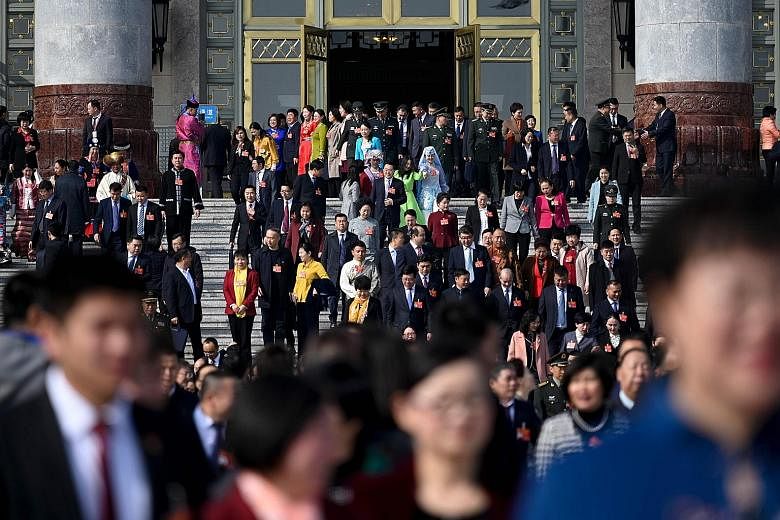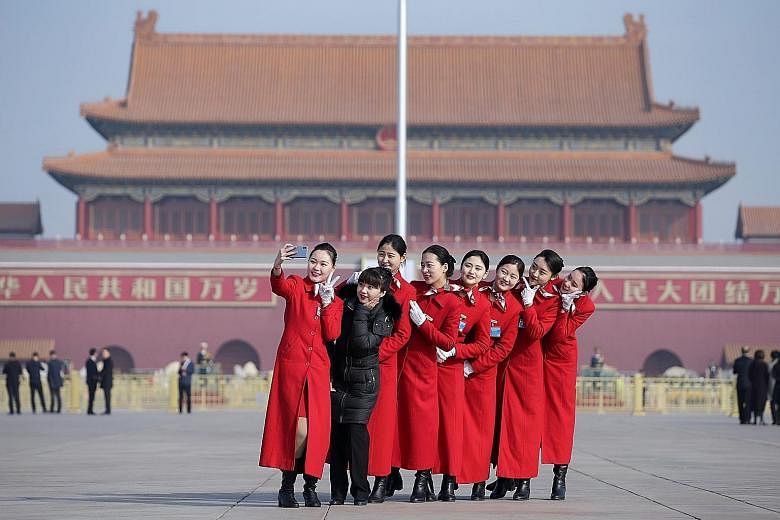Investors can expect a more transparent and predictable environment and enjoy the same treatment as Chinese companies under a widely anticipated foreign investment draft Bill that is likely to be passed into law next week.
A Chinese official who gave this assurance yesterday called the Bill a "fundamental change".
Mr Zhang Yesui, spokesman for the National People's Congress (NPC), or Parliament, said the legislation was drafted "in response to issues of great interest to investors", such as intellectual property protection and technology transfer.
Acknowledging that existing laws governing foreign investments had not "kept abreast of new developments", Mr Zhang said there was a need for fresh legislation as China continues to open up.
He was speaking to reporters at a press conference before the legislature was due to meet.
Foreign investors and American trade negotiators have complained about China's rule in making foreign companies transfer their proprietary technology to Chinese partners, in exchange for access to the country's large domestic market.
The fast-tracked law, which will ban forced technology transfer while opening more industries to foreign investment, comes as the United States and China close in on a trade settlement.
-
3,000
Approximate number of lawmakers expected at the Great Hall of the People today for China's annual parliamentary sitting.
2
Number of weeks the parliamentary sitting will last.
6-6.5%
Expected GDP growth target for 2019, to be announced by Premier Li Keqiang who will deliver the annual Budget.
While it will go some way in mending relations between the two countries, Mr Zhang also hit out at the US yesterday for targeting Chinese tech company Huawei, accusing it of double standards.
Describing some American officials as playing up the security risks of Chinese companies, Mr Zhang said such actions amount to political interference in economic activities and flout World Trade Organisation rules.
"This is a double standard and is neither fair nor ethical," he said, while attempting to dampen worries over a national intelligence law which demands that Chinese companies and citizens assist the authorities with access to information.
Mr Zhang explained that the 2017 law was meant to safeguard China's security and does not undermine other countries' national interests, and that China had drawn from similar laws from other jurisdictions, including the US, in drafting its own.
Nearly 3,000 lawmakers will gather at the Great Hall of the People starting today for China's annual parliamentary sitting, which will last about two weeks.
It kicks off with Premier Li Keqiang delivering the annual Budget at 9am.
Market and political watchers will be tuning in for an indication of where the government is taking the economy, especially a slowing one.
Mr Li is expected to announce a modest GDP growth target of between 6 per cent and 6.5 per cent and a slew of measures to boost domestic demand.
Last year, China registered its weakest growth in nearly three decades, expanding by 6.6 per cent.
Also keenly watched will be an announcement of the country's defence budget, which Mr Zhang yesterday said would be a "reasonable and appropriate" increase.
For the second year in a row, the defence expenditure has been kept under wraps ahead of the NPC opening, as China tries to downplay its spending amid fears of its growing military ambitions.
Mr Zhang pointed out that China's defence spending has maintained single-digit growth since 2016, and accounted for 1.3 per cent of GDP last year, while the defence budgets of other major developed countries take up 2 per cent or more.
"Whether one country poses a military threat to others, you have to look at its foreign and defence policies, not how much its defence budget has increased," said Mr Zhang, who also took the opportunity to reiterate China's defensive military approach.
China's war chest grew by 8.1 per cent to 1.11 trillion yuan (S$223 billion) last year, the biggest increase in three years.


